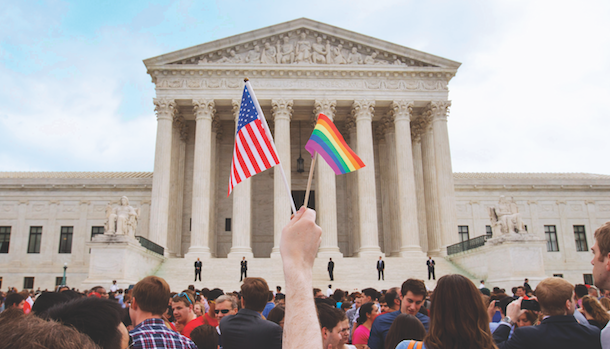RI Governor Signs Bill Allowing Civil Unions
PROVIDENCE, R.I. – Gov. Lincoln Chafee signed into law on Saturday a bill allowing gay couples in Rhode Island to enter into civil unions, acknowledging it was an imperfect piece of legislation but calling it a “step forward” toward full marriage rights in the state.
Chafee said the bill fails to give homosexual couples the full marriage rights given to heterosexual couples and that he was concerned that an exemption given to religious groups was too broad. But he added that the legislation “brings tangible rights and benefits to thousands of Rhode Islanders.”
The General Assembly voted Wednesday to approve civil unions, and Chafee had indicated he would sign the bill.
Gay rights groups urged Chafee to veto the measure, saying it continued discrimination against gays. The Roman Catholic Diocese of Providence denounced the Assembly vote, calling the concept of civil unions “a mockery of the institution of marriage as designed by God” that “undermines the well-being of our families and poses a threat to religious liberty.”
The push for civil unions came after an attempt to establish gay marriage fell short. Earlier this year, House lawmakers led by Speaker Gordon Fox passed a bill establishing gay marriage, but it ran into opposition in the state Senate. Fox, who is gay, then dropped the effort in favor of advancing civil union legislation, a move that led to heavy criticism by gay rights activists.
On Saturday, Fox was among those who attended the bill signing in the governor’s office and said he was focusing on the “many positives” of the legislation.
“Now same-sex couples will have all the rights, benefits and protections enjoyed by those who are married,” said Fox, D-Providence, in a statement.
The law also avoids a potentially divisive referendum question, he said.
Chafee, an independent, said he remained “committed to the passage of marriage equality, but democracy is about compromise.”
“I am convinced that Rhode Island will someday have full marriage equality, and I intend to play a role in that effort,” he said.
But the chair of the pro-gay marriage group Marriage Equality Rhode Island, Martha Holt, said she was “remarkably disappointed” in Chafee for signing “a bill that creates a second-class citizenry for thousands of lesbian and gay couples in loving, committed relationships.”
Holt said the bill’s unfairness was magnified by Chafee’s decision to sign it with no fanfare, and she added that only marriage will guarantee gay and lesbian couples the protection they deserve.
“Make no mistake about it, this bill not only falls short of providing equal rights and protection but will undoubtedly cause significant harm to same-sex couples in every corner of Rhode Island,” Holt said in a statement.
Six states- Massachusetts, Iowa, Vermont, New Hampshire, Connecticut and New York- and the District of Columbia have legalized gay marriage. New York’s GOP-controlled Senate approved gay marriage legislation last week after four Republican senators joined all but one Democrat in voting yes.
Republicans had demanded stronger legal protections for religious groups worried that they would be slapped with discrimination lawsuits if they refused to allow their facilities to be used for same-sex weddings.
Backers of New York’s gay marriage legislation held up the victory as one with national implications, saying it would give momentum to the broader gay marriage movement. But New York’s success left some in Rhode Island stinging over the fact that, even with a Democratic-controlled legislature and an independent governor who supports gay marriage, the state could muster only passage of civil unions, and with broad exemptions.
Several other states, including Illinois, Delaware and Hawaii, offer civil unions or domestic partnerships instead.
A key concern for gay rights groups was an exemption in the Rhode Island bill that says no religious organization or its employees may be required “to treat as valid any civil union.”
In his signing statement, Chafee called the scope of the exemption “unparalleled and alarming.” He said religious groups run hospitals, cemeteries, schools and community centers and could choose, for instance, to deny those in civil unions adjoining burial plots or the right to make medical decisions for their partners.
“This extraordinary exemption eviscerates the important rights that enacting a civil union law was meant to guarantee for same-sex couples in the first place,” he said.
But he added that the law “provides a foundation from which we will continue to fight for full marriage equality.”










